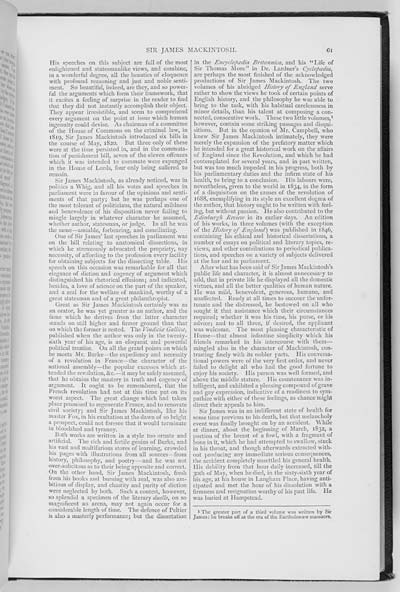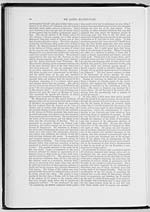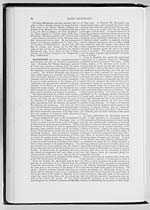61
His speeches on this subject are full of the most
enlightened and statesmanlike views, and combine,
in a wonderful degree, all the beauties of eloquence
with profound reasoning and just and noble senti-
ment. So beautiful, indeed, are they, and so power-
ful the arguments which form their framework, that
it excites a feeling of surprise in the reader to find
that they did not instantly accomplish their object.
They appear irresistible, and seem to comprehend
every argument on the point at issue which human
ingenuity could devise. As chairman of a committee
of the House of Commons on the criminal law, in
1819, Sir James Mackintosh introduced six bills in
the course of May, 1820. But three only of these
were at the time persisted in, and in the commuta-
tion of punishment bill, seven of the eleven offences
which it was intended to commute were expunged
in the House of Lords, four only being suffered to
remain.
Sir James Mackintosh, as already noticed, was in
politics a Whig, and all his votes and speeches in
parliament were in favour of the opinions and senti-
ments of that party; but he was perhaps one of
the most tolerant of politicians, the natural mildness
and benevolence of his disposition never failing to
mingle largely in whatever character he assumed,
whether author, statesman, or judge. In all he was
the same�amiable, forbearing, and conciliating.
One of Sir James' last speeches in parliament was
on the bill relating to anatomical dissections, in
which he strenuously advocated the propriety, nay
necessity, of affording to the profession every facility
for obtaining subjects for the dissecting table. His
speech on this occasion was remarkable for all that
elegance of diction and cogency of argument which
distinguished his rhetorical effusions; and indicated,
besides, a love of science on the part of the speaker,
and a zeal for the welfare of mankind, worthy of a
great statesman and of a great philanthropist.
Great as Sir James Mackintosh certainly was as
an orator, he was yet greater as an author, and the
fame which he derives from the latter character
stands on still higher and firmer ground than that
on which the former is rested. The Vindici� Gallic�,
published when the author was only in the twenty-
sixth year of his age, is an eloquent and powerful
political treatise. On all the grand points on which
he meets Mr. Burke�the expediency and necessity
of a revolution in France�the character of the
national assembly�the popular excesses which at-
tended the revolution, &c.�it may be safely assumed,
that he obtains the mastery in truth and cogency of
argument. It ought to be remembered, that the
French revolution had not at this time put on its
worst aspect. The great change which had taken
place promised to regenerate France, and to renovate
civil society; and Sir James Mackintosh, like his
master Fox, in his exultation at the dawn of so bright
a prospect, could not foresee that it would terminate
in bloodshed and tyranny.
Both works are written in a style too ornate and
artificial. The rich and fertile genius of Burke, and
his vast and multifarious stores of learning, crowded
his pages with illustrations from all sources�from
history, philosophy, and poetry�and he was not
over-solicitous as to their being apposite and correct.
On the other hand, Sir James Mackintosh, fresh
from his books and burning with zeal, was also am-
bitious of display, and chastity and purity of diction
were neglected by both. Such a contest, however,
so splendid a specimen of the literary duello, on so
magnificent an arena, may not again occur for a
considerable length of time. The defence of Peltier
is also a masterly performance; but the dissertation
in the Encyclopaedia Britannica, and his "Life of
Sir Thomas More" in Dr. Lardner's Cyclop�dia,
are perhaps the most finished of the acknowledged
productions of Sir James Mackintosh. The two
volumes of his abridged History of England serve
rather to show the views he took of certain points of
English history, and the philosophy he was able to
bring to the task, with his habitual carelessness in
minor details, than his talent at composing a con-
nected, consecutive work. These two little volumes,1
however, contain some striking passages and disqui-
sitions. But in the opinion of Mr. Campbell, who
knew Sir James Mackintosh intimately, they were
merely the expansion of the prefatory matter which
he intended for a great historical work on the affairs
of England since the Revolution, and which he had
contemplated for several years, and in part written,
but was too much impeded in his progress, both by
his parliamentary duties and the infirm state of his
health, to bring to a conclusion. His labours were,
nevertheless, given to the world in 1834, in the form
of a disquisition on the causes of the revolution of
1688, exemplifying in its style an excellent dogma of
the author, that history ought to be written with feel-
ing, but without passion. He also contributed to the
Edinburgh Review in its earlier days. An edition
of his works, in three volumes (with the exception
of the History of England) was published in 1846,
containing his ethical and historical dissertations, a
number of essays on political and literary topics, re-
views, and other contributions to periodical publica-
tions, and speeches on a variety of subjects delivered
at the bar and in parliament.
After what has been said of Sir James Mackintosh's
public life and character, it is almost unnecessary to
add, that in private life he displayed all the domestic
virtues, and all the better qualities of human nature.
He was mild, benevolent, generous, humane, and
unaffected. Ready at all times to succour the unfor-
tunate and the distressed, he bestowed on all who
sought it that assistance which their circumstances
required; whether it was his time, his purse, or his
advice; and to all three, if desired, the applicant
was welcome. The most pleasing characteristic of
Hume�that almost infantine simplicity which his
friends remarked in his intercourse with them�
mingled also in the character of Mackintosh, con-
trasting finely with its nobler parts. His conversa-
tional powers were of the very first order, and never
failed to delight all who had the good fortune to
enjoy his society. His person was well formed, and
above the middle stature. His countenance was in-
telligent, and exhibited a pleasing compound of grave
and gay expression, indicative of a readiness to sym-
pathize with either of these feelings, as chance might
direct their appeals to him.
Sir James was in an indifferent state of health for
some time previous to his death, but that melancholy
event was finally brought on by an accident. While
at dinner, about the beginning of March, 1832, a
portion of the breast of a fowl, with a fragment of
bone in it, which he had attempted to swallow, stuck
in his throat, and though afterwards extracted with-
out producing any immediate serious consequences,
the accident completely unsettled his general health.
His debility from that hour daily increased, till the
30th of May, when he died, in the sixty-sixth year of
his age, at his house in Langham Place, having anti-
cipated and met the hour of his dissolution with a
firmness and resignation worthy of his past life. He
was buried at Hampstead.
1 The greater part of a third volume was written by Sir
James: he breaks off at the era of the Bartholomew massacre.

![]() Universal Viewer |
Universal Viewer | ![]() Mirador |
Large image | Transcription
Mirador |
Large image | Transcription
![]()

